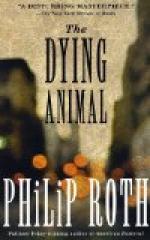|
This section contains 1,571 words (approx. 6 pages at 300 words per page) |

|
SOURCE: Haskell, Molly. Review of The Dying Animal, by Philip Roth. New Leader 84, no. 3 (May 2001): 38.
In the following review, Haskell identifies physical and emotional intimacy as key thematic concerns of The Dying Animal.
As preoccupied as it is with the frailties of the human body, there is nothing crepuscular about The Dying Animal, Philip Roth's intense novella-length monologue. David Kepesh, a.k.a, the Professor of Desire, is back and just as in thrall to the imperatives of the flesh at 70 as he was at 21. David K, you will remember, was the Roth protagonist in The Breast (1972) who, through a “massive influx of hormones,” turned into that organ one day. His enthusiasm for it remains undiminished. The object of his lust in the new book is Consuela Castillo. When their affair began six years earlier, she was a 24-year-old Cuban-American beauty and the student of choice in his...
|
This section contains 1,571 words (approx. 6 pages at 300 words per page) |

|


